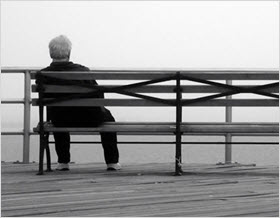Loneliness – ‘serious risk to your health’ – Doctors Warn
Posts before have related to how loneliness is a major cause of health related problems in the UK. With a breakdown in community over several decades, it is a major issue that needs to be tackled in some way.
Sarah O’Grady writes in the Daily Express – loneliness can have a massive impact on a person’s health according to a study.
Spending too much time alone can lead to depression, insomnia and even suicidal thoughts.
Scientists at the University of Chicago found social isolation did not just affect the elderly, widowed or retired, with family living far away.
Up to 80 per cent of Americans under the age of 18 reported being lonely at least some of the time. And 40 per cent aged over 65 complained they regularly felt lonely.
 Overall a third of the population said they suffered from chronic loneliness.
Overall a third of the population said they suffered from chronic loneliness.
This sense of isolation could have a serious effect on both mental and physical health, according to Dr Louise Hawkley of the National Opinion Research Centre at the University of Chicago.
Her study included children who complained of feeling lonely and miserable. By the time they reached adolescence, many socially isolated teenagers began to suffer from depression and think about suicide.
And the more time they felt lonely during their childhood and adolescence the greater the risk to their future health and cardiovascular health, the study found.
By the age of 26, they were more likely to suffer higher cholesterol and blood pressure and be more overweight than their more social peers.
These ailments continued in some people as they got older with loneliness contributing to cognitive decline and dementia from the age of 50 onwards.
Dr Hawkley’s researchers found a link in the brain function of a group of 70-year-olds between the intensity of loneliness and cognitive ability as well as processing speed and memory.
She said it was important to understand the impact isolation had on health and what could be done to improve social links.
“Understanding the factors that protect against loneliness may suggest intervention targets that harness the power of social connectedness to reduce the health and fitness consequences of loneliness,” she said. In a related study, researchers found long-term feelings of extreme loneliness could be deadlier for older people than being obese.
They tracked 2,000 people aged 50 and over for six years and found, compared to the average person in the study, those who reported being lonely had a 14 per cent greater risk of dying.
Researchers also found a direct link between chronic feelings of loneliness and increased blood pressure.
In another study 229 people aged 50 to 68 were monitored for five years.
They had to rate their connections with others, through statements such as “I have a lot in common with the people around me” and “I can find companionship when I want it.”
A link between loneliness reported at the start of the study and rising blood pressure was found – even among those with modest levels of loneliness.
“It follows that the awful ache of loneliness is not just felt by the sufferer it is a scar on our whole society”



